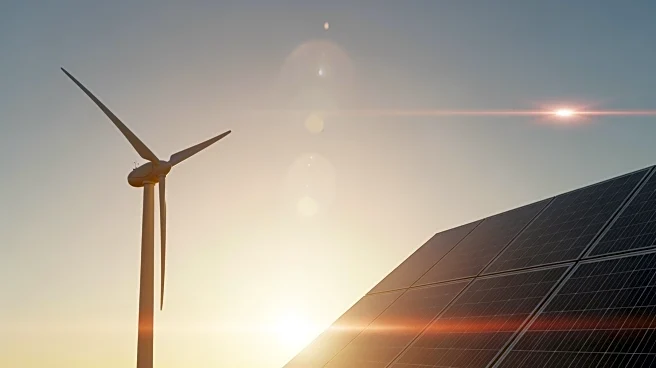What's Happening?
The International Energy Agency (IEA) has released a report suggesting that now is an opportune time to invest in climate technology. This comes as political and investor interest in climate tech appears
to be waning, despite the ongoing global warming trend. The IEA's report highlights a significant shift in emission forecasts over the past decade. In 2014, the agency predicted a continuous increase in carbon emissions, with a worst-case scenario of 46 metric gigatons of CO2 per year by 2040. However, current projections indicate that emissions could level off at 38 metric gigatons per year if countries maintain their current policies, and potentially decrease to 33 metric gigatons per year if pledges are fulfilled. This shift suggests a more optimistic outlook for climate tech, driven by advancements in renewable energy and changes in global policy.
Why It's Important?
The IEA's report underscores the potential for climate tech to play a crucial role in reducing global carbon emissions. As countries strive to meet their climate pledges, investments in technologies such as solar, wind, and battery storage are becoming increasingly vital. The report suggests that the world may be at an inflection point, where the rate of change in emissions is accelerating towards a downward trend. This presents significant opportunities for investors in climate tech, as the demand for sustainable solutions grows. The shift in emission forecasts also reflects broader changes in global energy policies, with countries like China committing to peak emissions before 2030 and developing nations adopting renewable energy sources.
What's Next?
The IEA's report may encourage increased investment in climate tech, as stakeholders recognize the potential for significant returns. As countries continue to implement policies aimed at reducing emissions, the demand for innovative technologies is likely to rise. This could lead to further advancements in areas such as geothermal energy and grid-optimizing software, which are poised to drive the next wave of optimism in climate tech. Investors and policymakers will need to closely monitor these developments to capitalize on emerging opportunities and support the transition to a low-carbon economy.
Beyond the Headlines
The evolving landscape of climate tech investment highlights the ethical and economic dimensions of addressing climate change. As the world moves towards cleaner energy solutions, there are implications for job creation, energy security, and global competitiveness. The shift in emission forecasts also raises questions about the accuracy of past predictions and the role of technological innovation in shaping future outcomes. As countries strive to meet their climate goals, the integration of sustainable practices into economic and social frameworks will be essential for achieving long-term environmental and economic stability.









